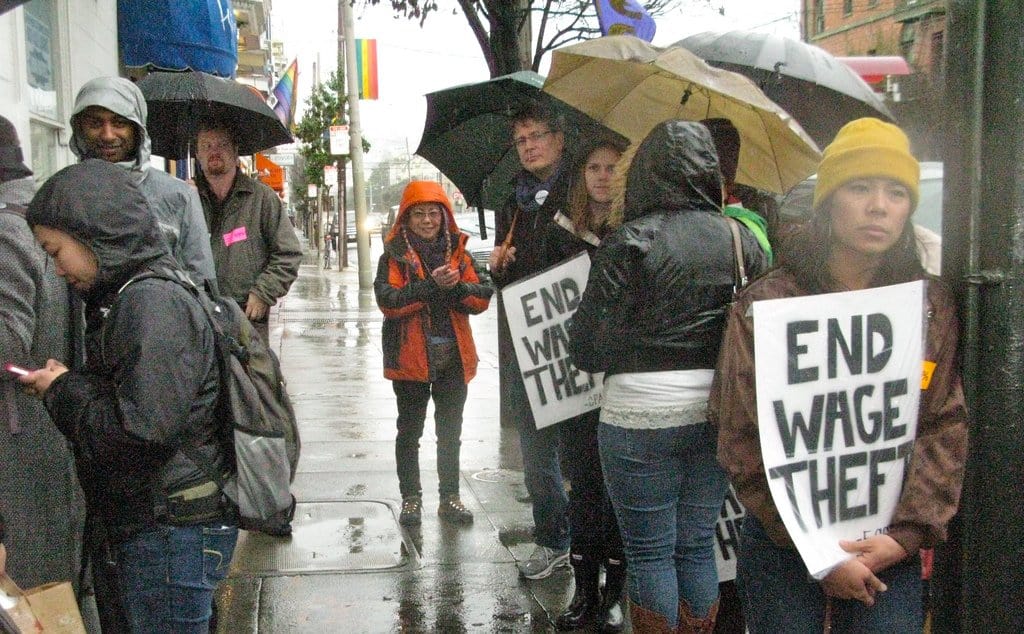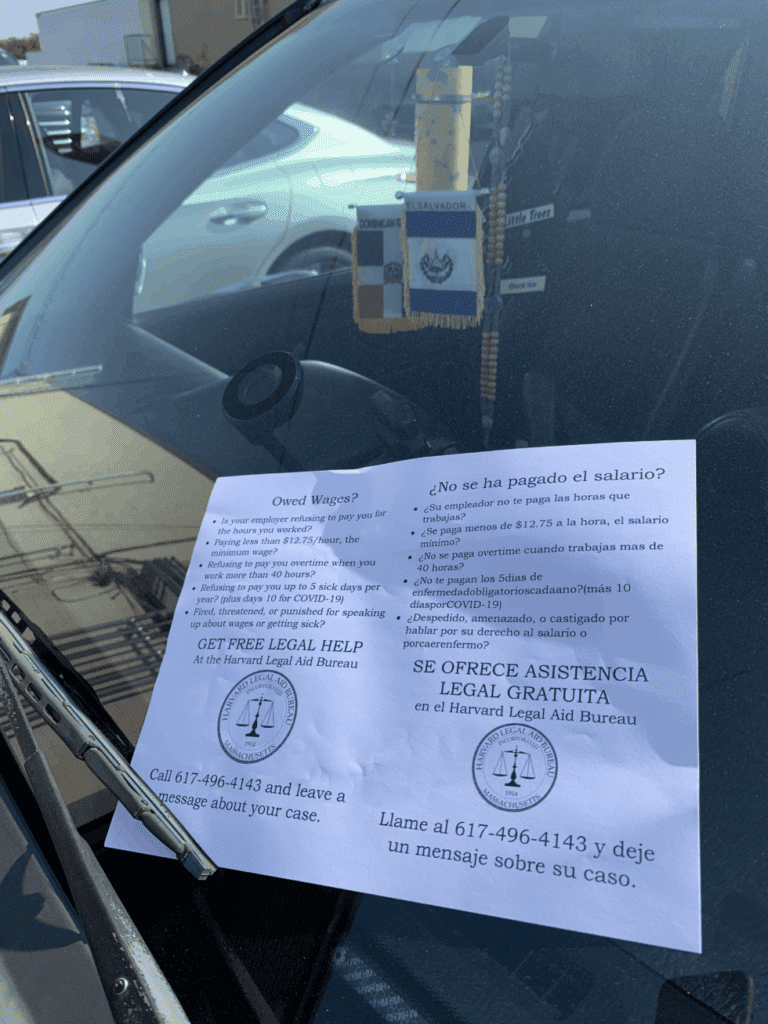David Seligman is Director of Towards Justice in Denver, Colorado. There, he litigates cases on behalf of low-wage workers attacking labor market abuses like wage theft and antitrust violations. He's also a Contributing Author at the National Consumer Law Center, where he writes on forced arbitration of consumer and employment disputes.
In his recent post, “Rethinking Wage Theft Criminalization,” Ben Levin argues that “the impulse to use criminal law for ‘progressive’ ends”—like combatting wage theft—“is dangerous; it serves to bolster the carceral state and all of its deep structural flaws.”
We write from the perspectives of lawyers who have had extensive experience protecting workers’ rights, one as a former government enforcer and the other as an attorney at an advocacy organization. While we of course appreciate the deep structural flaws of our criminal justice system, we’ve seen how important a tool the criminal law can be in protecting workers from wage theft, and we don’t think that bringing the criminal law to bear on predatory employers who take advantage of vulnerable workers exacerbates the injustices of our criminal justice system. If anything, doing so expresses to the most vulnerable members of society that the criminal law can work for them, not just against them. Progressive policymakers and enforcers would be misguided to eschew the tools of criminal law in combating the scourge of wage theft.
The most important reason to employ criminal law tools in certain wage theft cases is that the civil law, while critically important, also has its limits in deterring illegal conduct, responding promptly to abuses, and in punishing chronic wrongdoers.
First, as for deterrence, we’ve both seen how employers who do not fear serious sanction for violations engage in persistent wage theft and payroll fraud. We are not aware of any research regarding the deterrent impact of criminal prosecution in such cases, and certainly such studies are needed, but ample anecdotal evidence exists to support the common-sense notion that fear of arrest draws attention from employers and changes their conduct more meaningfully than the threat of civil enforcement. We’ve both witnessed how openly some employers flout the law when they don’t think they’ll ever be held accountable, and while heavy civil penalties are sometimes enough to deter some bad actors, others do everything they can to hide assets, even telling their employees that no one will ever find their money. In these cases, the threat of jail, however unlikely, seems to be the only way of deterring misconduct.
Levin disputes any deterrent impact by citing to literature primarily demonstrating little to no deterrent effect of increased criminal penalties in situations that are not analogous to wage theft—for example, the death penalty has little to no deterrent effect on homicide. However, one of Levin’s sources notes that increased penalties do deter certain types of crimes, citing as an example tax evasion, which is similar to wage theft in that it often involves persistent and calculated misconduct committed by those who may think that their crimes are unlikely to be discovered.
Further, as a practical matter, making wage theft a violation of the criminal laws can empower enforcers to respond more effectively to violations. While some civil enforcement agencies engage in proactive outreach efforts, in some regions, such as Denver, marginalized workers who are victims of wage theft or other abuses by their employer often make first contact with police departments. Typically, these workers are told that wage theft is a civil matter and that the police won’t get involved. The distinction between civil and criminal law is confusing and illogical to workers who’ve taken a courageous step in coming forward to report abuse, and this initial conversation with law enforcement can be quite discouraging. The police, as the front lines of criminal law enforcement, should have the same tools available for wage theft as for other forms of theft.
Consider also how the criminal law can punish chronic and recalcitrant wrongdoers. In a case brought by the New York Attorney General’s Office, the U.S. Department of Labor obtained a federal consent judgment from a janitorial contractor. The employer paid the money owed, and then demanded kickbacks from workers while continuing to violate the law. It is unlikely that meaningful impact would result from further civil enforcement.
Levin seems to fear that criminalizing wage theft will have broad consequences for everyday wrongdoing. Prosecutors, however, exercise discretion and have limited resources; they are not likely to impose criminal sanctions on a whim or for minor, technical violations of wage-and-hour laws. The nature of labor violation cases further mitigates against extremes: these are typically complex cases which can take months or more to develop. Also, the lengthy sentences Levin fears are unlikely to occur, since judges rarely if ever impose jail time for wage theft.
In fact, criminal wage theft prosecutions often involve a constellation of violations beyond denial of lawful wages, including nonpayment of payroll and unemployment taxes; failure to obtain workers’ compensation insurance; falsification of documents; health and safety violations; government procurement fraud; and sometimes even sexual assault or human trafficking. Criminalizing wage theft logically situates the denial of lawful wages alongside these other abuses as a category of wrongful conduct that harms private individuals and the public generally, and it empowers prosecutors to attack pervasive workplace abuse.
The main thrust of Levin’s post is that the criminal justice system is deeply troubled and that we should be reluctant to expand its scope. But what makes the system unjust is that it has in many cases become a brutal tool in the subjugation of marginalized people, in particular poor people of color. The powerful and marginalized alike tend to appreciate this aspect of our criminal justice system. For this reason, employers with power over their workers tend to doubt that the criminal law will ever hold them accountable, while workers, often as a consequence of the direct threats of their employers, fear the possibility that scrutiny from enforcers will somehow result in legal trouble for them—such as immigration problems.
In this context, the threat of serious criminal sanction running the other direction—against the person who’s abused his position of power—helps to correct that power imbalance and serves an important expressive function. It signals to employers and workers that wage theft causes severe harm, both to private individuals and the public generally, and that society is willing to criminally punish the powerful who take advantage of the vulnerable and marginalized.
Those of us who have spent our careers protecting and enforcing workers’ rights, whether as advocates, union leaders, academics, or government officials, have time and again seen scofflaw employers show relentless impunity and reckless disregard for their workers and for rule of law. These predatory employers hide assets, dissolve corporations, demand kickbacks, cheat on taxes, create fake records, shave hours, endanger workers, fire employees who complain, and persistently violate the law even after losing lawsuit. While criminal sanction should be invoked carefully and only for very bad actors, the threat of prosecution is an important and effective tool in policing wage theft, which is one of the most prevalent crimes in the market and inflicts serious harm on the most marginalized members of society.










Daily News & Commentary
Start your day with our roundup of the latest labor developments. See all
July 11
Regional director orders election without Board quorum; 9th Circuit pauses injunction on Executive Order; Driverless car legislation in Massachusetts
July 10
Wisconsin Supreme Court holds UW Health nurses are not covered by Wisconsin’s Labor Peace Act; a district judge denies the request to stay an injunction pending appeal; the NFLPA appeals an arbitration decision.
July 9
the Supreme Court allows Trump to proceed with mass firings; Secretary of Agriculture suggests Medicaid recipients replace deported migrant farmworkers; DHS ends TPS for Nicaragua and Honduras
July 8
In today’s news and commentary, Apple wins at the Fifth Circuit against the NLRB, Florida enacts a noncompete-friendly law, and complications with the No Tax on Tips in the Big Beautiful Bill. Apple won an appeal overturning a National Labor Relations Board (NLRB) decision that the company violated labor law by coercively questioning an employee […]
July 7
LA economy deals with fallout from ICE raids; a new appeal challenges the NCAA antitrust settlement; and the EPA places dissenting employees on leave.
July 6
Municipal workers in Philadelphia continue to strike; Zohran Mamdani collects union endorsements; UFCW grocery workers in California and Colorado reach tentative agreements.